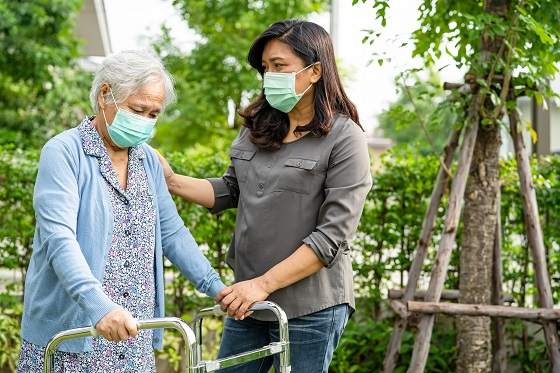Many adult children wonder when it’s time to find in-home care for a loved one. If you find yourself stopping over more often to check on your aging parents or other family members, now may be the time to look at home care options.
Investing your time as a family caregiver is admirable and fulfilling. It’s the circle of life. As your parents cared for and supported you, now you’re returning the love you’ve received over the years. During your visits, you may refill their pantry, look for expired items in the fridge or take out the trash. You also spend time chatting, bringing cheer into their daily life. The time you spend together is valuable and essential.
But it’s still frightening when you don’t feel confident that they are safe at home. You might also begin to feel stress and frustration as you’re spending more time with them and the rest of your life feels out of balance. Sadly, your loved one is probably also feeling the strain as they worry about their inability to live independently.
If you notice that Mom or Dad or another at-risk family member requires more support than you can provide, what do you do?
When to Consider In-Home Care
When your loved one’s needs have extended beyond a little bit of extra support, it’s a good time to consider in-home care. Here are some specific signs to look for:
They Need Help with Personal Hygiene
If you’re noticing a change in your loved one’s dressing or bathing habits, it could be an early sign of a decline in their health, particularly for those with dementia.
When your loved one requires help with bathing, dressing or other personal care needs, it will be more comfortable for both of you to hire a caregiver. A compassionate professional can help with daily personal hygiene in a way that maintains dignity and respect.
They’re Not Safe on Their Own
Potential safety issues are another warning sign it’s time to consider in-home care. Did your loved one leave the house and get lost? Is there a decline in their vision or hearing? Or are there issues with mobility? Other situations, like multiple slips and falls, worsening health conditions, chronic forgetfulness or not eating regularly can also be red flags that professional care is needed.
They’re Missing Doctor’s Appointments
With age, comes more visits to the doctor. If, however, your loved one is missing appointments because it’s not safe for them to drive, then consider an in-home care professional to help with transportation. Preventative care is critical to good health. In fact, 80% of common illnesses are preventable through early intervention and recognizing or addressing a need before it escalates. If a loved one is missing appointments, it could cost them dearly in the form of their health.
They’re Bored and Lonely
Chronic isolation has a negative impact on physical, emotional and mental health. If you struggle to carve out enough time in your day to keep your loved one engaged and in good company, it’s time to consider an in-home caregiver. Companion care can include visiting with your loved one, playing games or cards and having a meal together. A caregiver can ensure your family member is getting the company and conversation they’re craving, contributing to a stronger sense of overall well-being.
You’re Seeing Changes in Their Personality
If a loved one is acting differently or seems “off,” it could be a sign of a more serious underlying condition. Issues like dementia can creep up slowly, impacting an individual’s ability to function.
You might start to notice it in the form of erratic behavior, withdrawing from social conversation or neglect in the home, from garbage piling up to old food sitting in the fridge. These are red flags your loved one is having trouble with basic housekeeping and maintenance. It’s important to get help right away since this kind of environment is unsanitary and unsafe for an aging or disabled individual.
You Can’t Keep Up
There are only so many hours in each day. You have your own family and home to manage, as well as your loved one’s. If it’s becoming increasingly difficult and exhausting to keep up with both, then consider hiring in-home care.
Home care companies provide access to caregivers who will assist with light housekeeping and meal preparation. Caregivers also help by running errands and going grocery shopping, so you don’t have to worry about expiring food in the fridge or transportation for your loved one. You also don’t have to be the one who’s handling all the household chores. You and your loved one can both get help and enjoy a better quality of life.
Most importantly, an in-home caregiver can ensure your loved one remains safe. Whether they require assistance while showering or shaving or help getting around the house, you won’t have to stress about their safety. If your loved one has dementia or Alzheimer’s, you can also request caregivers with experience in these areas. Your loved one will be in capable and compassionate hands, living a more enriching life, happily at home.
Wondering how to find the right in-home care company? Tune in next month for tips on choosing one or simply contact FirstLight® Home Care to find a local caregiver near you.
